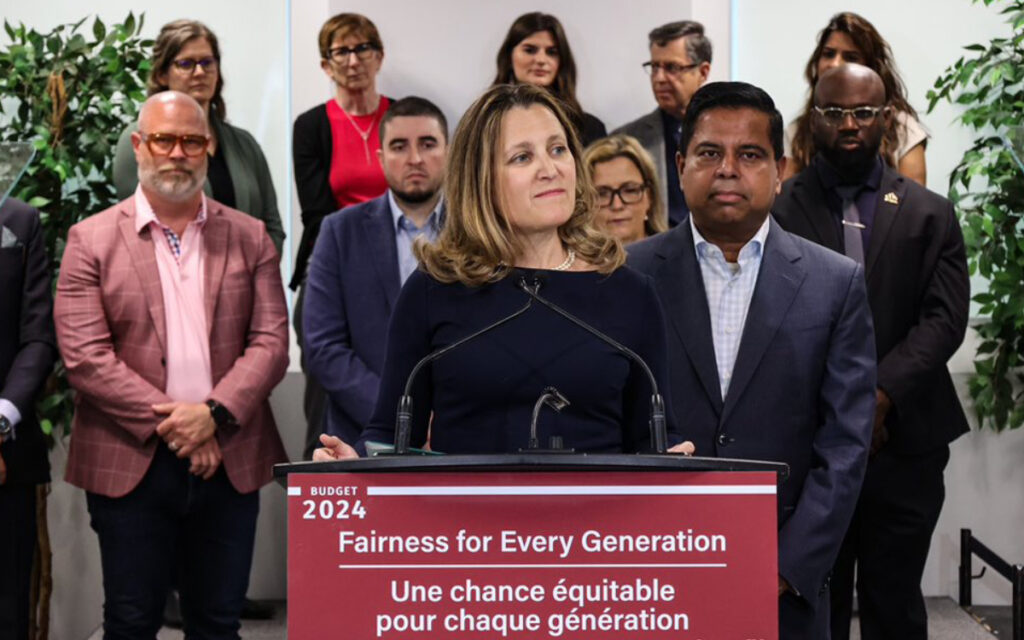It seems the Trudeau Liberals are now looking to see how they can raid the Canada Pension Plan. Pictured: Deputy Prime Minister and Finance Minister Chrystia Freeland. Photo Credit: Chrystia Freeland/X.
This Liberal federal government reminds this author of the rich kid who gobbles down all of his Halloween candy, wasting half of it, then sets his sights on the poor kid’s candy that kid is trying to save because he doesn’t get candy very often. After burning through more of our tax dollars by far than any other federal government in Canada’s history, and wasting much of it on payoffs to their friends, foolish business subsidies, pricey foreign aid so despots in third world countries can buy themselves a new Rolls Royce, expensive half-baked social programs and pointless virtue-signalling policies for things like the climate and gender identity, it seems these Liberals are now looking to see how they can raid the Canada Pension Plan (CPP). Since that fund currently sits at about $650 billion, it is a pretty tempting target for a government that is facing record debt, annual $50-billion debt interest payments that exceed what it sends to the provinces for health care and more difficulty finding willing lenders to finance its endless spending.

As the Trudeau Liberals have so thoroughly ruined Canada’s financial position, they need to borrow more and more just to maintain their current extravagance. Finance Minister Chrystia Freeland claims she is being “prudent” with every budget but is sadly just another Liberal lie. Taking on a certain amount of debt for a defined period of time can be a sensible policy in the short term, as was the case for many countries during the COVID crisis. However, constantly borrowing to fund spending that grows excessively every single year with ever-increasing debt payment costs is not sustainable, as Canada found out in the mid-1990s when the debt hangover from the first Trudeau came home to roost and foreign lenders refused to pony up any more before the Canadian government demonstrated that it could be financially responsible.
Seems we’re there again, courtesy of Trudeau the Second. Rating agencies are becoming increasingly skittish about Canada’s financial status, and you can’t blame them. Lenders that perceive more risk may continue to lend, but at a higher cost which just digs the debt hold deeper. Seems Canada is currently on the verge of going to lending markets akin to the payday lenders who charge very high interest rates and rarely if ever help any creditor get out of the financial hole.
Over the past year or two, there have been musings from the corporate community and some Liberal politicians about how money in the giant CPP fund could be used differently. In March 2024, about 100 large corporate CEOs wrote to Freeland and provincial Finance ministers to suggest Canadian pension plans should be forced to invest more in Canada. The CEOs noted how the investments of funds like the CPP in publicly traded Canadian corporations had dropped significantly in recent years. This is true, but only because these Canadian investments were not earning the best rates of return. Pension funds in general – and especially ones many Canadians rely on such as the CPP – should always pursue the best returns for their pensioners, not social goals, desires of government or fantasies of CEOs.
A recent development about the fortunes of the CPP investment pool emerged in a Parliamentary Committee discussion earlier this week about the Liberals’ increase in the capital gains tax. Under questioning from Conservative MPs, Parliamentary Budget Officer Yves Giroux spoke about how the capital gains tax change would without question negatively impact the rate of return of CPP and other pension plan investments as many Canadian companies would be hit by this tax hike. Considering this reality, it may also be yet another incentive for pension funds to invest outside of Canada where businesses are not subject to such an onerous capital gains tax regime.
It seems once again the Liberals have implemented a policy that they thought would be politically popular – in this case because they claimed it would only tax the very rich (a big lie to start with) – only to find when better informed people looked at the policy’s fallout it would have far more negatives than positives. This is a common outcome with this Liberal government, which doesn’t have the Cabinet expertise to understand what they are doing and doesn’t bother to listen to people that do.
Looking back in time, this is not the first time Liberals have messed around with funds in which Canadians have invested, with a mind to grabbing money for purposes other than what the funds were originally intended. A good example took place back in the late 1990s when the Chretien Liberals were struggling to balance the books. The Liberals had allowed an enormous $57 billion surplus to build up in the Employment Insurance (EI) account, funds that were supposed to be dedicated to EI purposes. When the mid-90s financial crisis hit, Finance Minister Paul Martin grabbed this $57 billion to apply to the debt, betraying the expectation of Canadian employees and employers that these funds would be used for EI purposes only.
This demonstrates once again the danger of permitting governments to build up pots of taxpayer money in various areas that can then be used for any purpose the government deems appropriate at the time, not necessarily the purpose the government used to justify raising the money in the first place. A proper system should have funds allocated to specific programs – within reasonable contingencies for emergencies – which can only be spent for those stated purposes or returned to taxpayers if not needed.
Late last year, Freeland herself mused about using pension funds to benefit the Canadian economy in ways Liberals would prefer, such as in climate-related or social justice policies, ones that tend to lose money. Perhaps instead of making a mess of the Canadian economy and creating a climate which repels foreign and domestic investors, Freeland and her colleagues should consider sensible means of improving economic growth, making Canadian businesses more competitive and Canadian investments more attractive to investors instead of contemplating ways of forcing pension funds which Canadians value to invest in money losers. Because that’s what a banana republic does, and we don’t want to go there.
